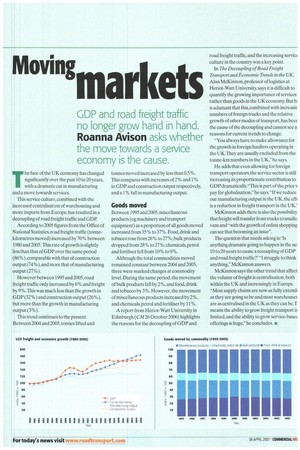Moving markets
Page 53

If you've noticed an error in this article please click here to report it so we can fix it.
GDP and road freight traffic no longer grow hand in hand.
Roanna Avison ass whether the move towards a service economy is the cause.
71 he face of the UK economy has changed significantly over the past 10 to 20 years, with a dramatic cut in manufacturing and a move towards services.
This service culture, combined with the increased centralisation of warehousing and more imports from Europe, has resulted in a decoupling of road freight traffic and GDP.
According to 2005 figures from the Office of National Statistics, road freight traffic (tonnekilometres moved) increased by 70 % between 1980 and 2005. This rate of growth is slightly less than that of GDP over the same period (86%),comparable with that of construction output (74%), and more that of manufacturing output (27%).
However between 1995 and 2005, road freight traffic only increased by 6% and freight by 9 %.This was much less than the growth in GDP (32%) and construction output (26%), but more than the growth in manufacturing output (3%).
This trend continues to the present. Between 2004 and 2005, tonnes lifted and tonnes moved increased by less than 0.5%. This compares with increases of 2% and 1% in GDP and construction output respectively, and a 1% fall in manufacturing output.
Goods moved Between 1995 and 2005,miscellaneous products (eg machinery and transport equipment) as a proportion of all goods moved increased from 35% to 37%. Food,drink and tobacco rose from 26% to 27 %; bulk products dropped from 28% to 27%; chemicals, petrol and fertiliser fell from 10% to 9%.
Although the total commodities moved remained constant between 2004 and 2005, there were marked changes at commodity level. During the same period, the movement of bulk products fell by 2%, and food, drink and tobacco by 3%. However, the movement of miscellaneous products increased by 2%, and chemicals, petrol and fertiliser by 11%.
A report from Heriot-Watt University in Edinburgh (CM 26 October 2006) highlights the reasons for the decoupling of GDP and road freight traffic, and the increasing servict culture in the country was a key point.
In The Decoupling of Road Freight Transport and Economic Trends in the UK, Alan McKinnon, professor of logistics at Heriot-Watt University, says it is difficult to quantify the growing importance of services rather than goods in the UK economy. But is adamant that this, combined with increasir numbers of foreign trucks and the relative growth of other modes of transport, has beer the cause of the decoupling and cannot see a reasons for current trends to change.
"You always have to make allowance for the growth in foreign hauliers operating in the UK.They are usually excluded from the tonne-km numbers in the UK," he says.
He adds that even allowing for foreign transport operators, the service sector is still increasing its proportionate contribution to GDP dramatically. "This is part of the price pay for globalisation," he says. "If we reduce our manufacturing output in the UK, the effi is a reduction in freight transport in the UK.'
McKinnon adds there is also the possibility that freight will transfer from trucks to smalle vans and "with the growth of online shopping can see that becoming an issue".
The question that needs asking is:` Is anything dramatic going to happen in the ne 10 to 20 years to cause a recoupling of GDP and road freight traffic?' "I struggle to think anything," McKinnon answers.
McKinnon says the other trend that affect the volume of freight is centralisation, both within the UK and increasingly in Europe. "Most supply chains are now as fully extend' as they are going to be and most warehouses are as centralised in the UK as they can be.T means the ability to grow freight transport is limited, and the ability to grow service-basec offerings is huge," he concludes. •






















































































































































































